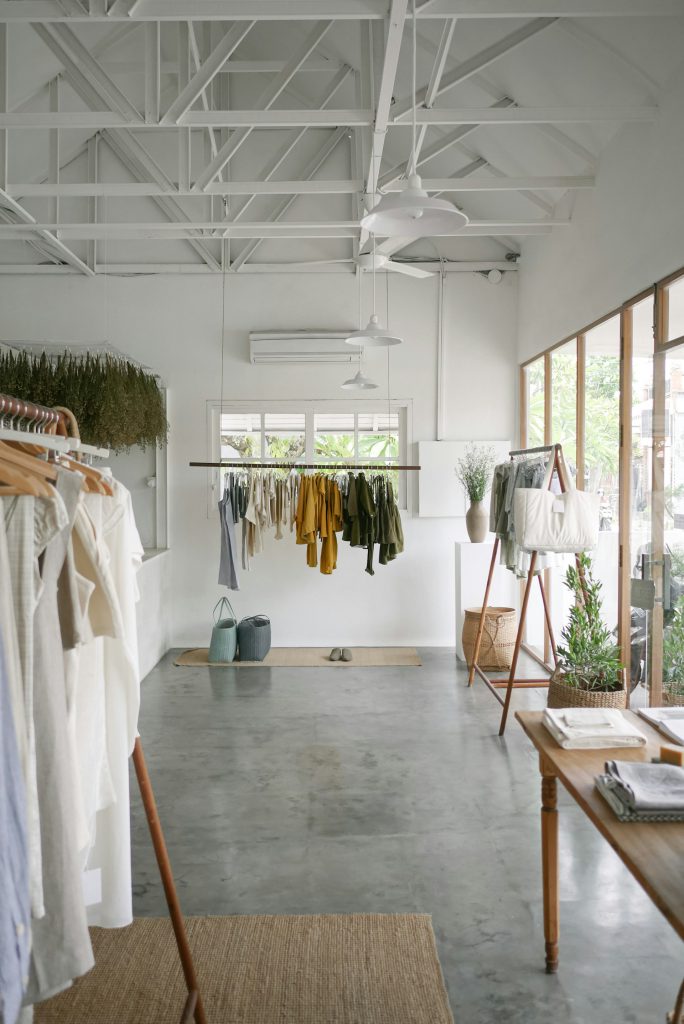
Sustainable Style: Launching Your Eco-Fashion Start-Up in a Physical Shop

Photo by Valeria Odnovol on Unsplash
In a world where environmental consciousness continues to rise, the fashion industry is beginning to recognise the need to shift towards more sustainable and ethical clothing. Eco-fashion is becoming more mainstream and so if you’re considering setting up an eco-fashion start-up and envision your brand making a positive impact, a physical shop is an excellent way to connect with your audience on a personal level. In this blog, we’ll look at some steps to consider as you launch your eco-conscious venture.
Natural and Sustainable Materials:
- Choose eco-friendly materials for flooring, walls, and fixtures. Consider options like reclaimed wood, bamboo, recycled metal, or low-VOC (volatile organic compounds) paints.
- Use sustainable fabrics for upholstery and curtains, opting for materials such as organic cotton or hemp.
Energy-Efficient Lighting:
- Look for retail units that have large windows and skylights.
- Opt for LED lighting, which is energy-efficient and has a longer lifespan than traditional bulbs.
- Consider adjustable blinds or curtains to control sunlight and reduce the need for artificial lighting.
Greenery and Biophilic Design:
- Integrate plants into your shop design to enhance the overall aesthetic and air quality.
- Create a connection with nature by incorporating biophilic design elements, such as natural textures and patterns.
Upcycled Fixtures and Furniture:
- Give a second life to old furniture or fixtures by upcycling them. This not only reduces waste but also adds a unique and eclectic touch to your store.
- Consider sourcing second-hand furniture or working with local artisans to create bespoke pieces with recycled materials.
Efficient HVAC Systems:
- Invest in energy-efficient heating, ventilation, and air conditioning (HVAC) systems to minimise your environmental impact.
- Implement smart controls to optimise energy consumption based on the store’s occupancy and external conditions.
Waste Reduction Strategies:
- Design your shop layout with waste reduction in mind, considering both product packaging and store operations.
- Incorporate recycling stations for customers and staff to encourage proper disposal of waste.
Modular and Flexible Layout:
- Use modular and adjustable shelving and fixtures to accommodate changes in product displays and promotions. This flexibility allows you to adapt your store layout without needing to invest in new materials.
- Design a layout that can be easily reconfigured to adapt to changing needs or seasonal displays.
Inventory Management:
- Implement a just-in-time inventory system to reduce excess stock and minimise overordering.
- Monitor sales trends and adjust orders accordingly to avoid unsold items that may contribute to waste.
Repair, Recycle and Repurpose Station:
- Create a designated area for repairing damaged items or repurposing unsold inventory.
- Offer repair services for customer-owned items to promote a culture of sustainability and longevity.
- Designate a packaging station with recyclable materials for gift wrapping or bagging customer purchases.
Reusable Signage and Displays:
- Invest in durable and reusable signage and displays to stop the need for constant replacements.
- Use chalkboards, whiteboards, or digital displays that can be updated easily without generating additional waste.
Digital Receipts and Communication:
- Encourage digital receipts to minimise paper waste. If paper receipts are necessary, use recycled and recyclable paper.
- Utilise digital communication channels for marketing materials and customer newsletters to reduce the need for printed materials.
Launching an eco-fashion shop is an exciting endeavour that allows you to combine your love for fashion with a commitment to environmental responsibility. By following these steps and staying true to your eco-friendly values, you can create a space that not only showcases stylish sustainable fashion but also inspires positive change within the industry. As you embark on this journey, remember that every small step towards sustainability contributes to a more eco-conscious and ethical future for fashion.
